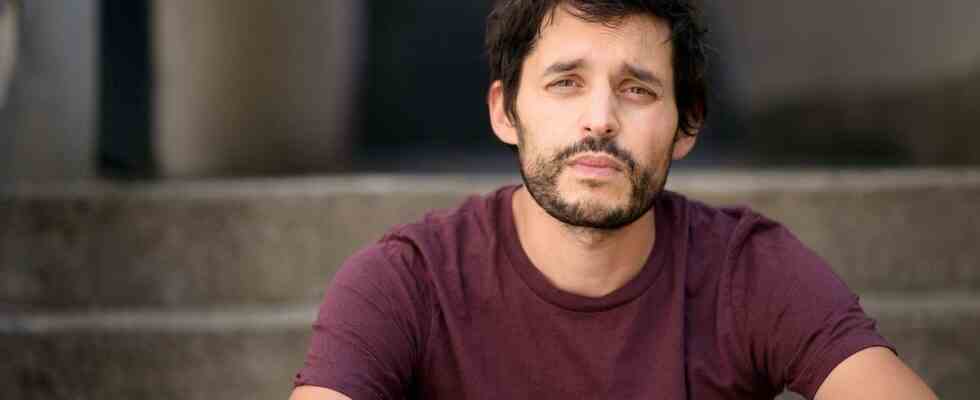In a café in the Liberation district of Nice, Anthony Passeron finally “poses”. He returned from Manosque and left the next day for Metz. It will be “like this for the next three months”, for dedications or festivals. Since the release of his book sleeping children, at Globe editions, he “does not stop”.
This novel is the story of his family, who lives in a village in the hinterland of Nice and who will discover AIDS through the favorite child of the siblings and his addiction to heroin. At the same time, the book traces French medical research on the subject. Already winner of the Première Plume prize, this book was selected for the Flore, Welper and December prizes. The author still managed to take the time with 20 minutes to return to its history “both intimate and collective”.
What was your reaction to the reception of your book?
I am overwhelmed. I did not expect that. There are 90 first-time novelists coming out at the start of the school year. So I didn’t expect to stand out in this way. It is also thanks to the publishing house (Globe) and its work upstream. We already had positive feedback from booksellers during the summer and it was confirmed in September. For my part, I do not realize since it is my first work. I don’t have the perspective and the elements of comparison. And then when I started writing, four years ago, I didn’t think this book was going to leave my room. I wrote as if it would never be published.
How did you build the history of sleeping children ?
It’s the story of my uncle, whom I knew without really knowing. It’s a family secret, something we don’t talk about. But I couldn’t find myself in this silence. One day I realized that there was something wrong with my intimate life. After exhausting several shrinks, I turned to writing. And it did me a lot of good. I first listed the scenes experienced to begin the story. Then, I asked my family for details, but the answer each time was “we didn’t know what was happening at the time”. I then said to myself that it was important to fill these voids with research. I discussed with sociologists, doctors, all kinds of professionals to trace the appearance of this disease in a village far from the healthcare systems but also to recall how it arrived and perceived in France. It was then very important for me to compare advances in medical research. Finally, this book is also for my family, it’s their story and the one they missed.
This village in the hinterland of Nice, you do not name it in the book. For what reasons ?
I didn’t want to put the name of the village, not to protect my family but so that everyone could recognize their village. And I also had a lot of feedback and testimonies that many young people had fallen into drug addiction at that time in their village. People then wondered if the village was not in Vésubie or in Tinée. But it’s Puget-Théniers. The writing exercise was to turn an intimate story into a collective experience. In general, through my research, I discovered that the Côte d’Azur was particularly affected by heroin in the late 1970s, with a cultural factor which escapes me but which can be explained by this desire to have a life different from that of the parents.
Are they then the “sleeping children”?
When I had to think about the title, I wanted to find a title that would not be the beginning of my story but that of the beginning of the phenomenon that will hit a village. And indeed, it marked me because my grandfather, who never talked about this story and only did so thanks to Alzheimer’s, said “we found your uncle sleeping in the street” with a syringe in the arm. It was also the expression used by Nice doctors to talk about these young heroin addicts. Indeed, this drug is not consumed in the secrecy of the apartments, by effect of lack, one does not wait to return to be pricked and it is in that that it poses problem in the public way.
Forty years later, this story also echoes other pandemics…
Indeed, with the Covid-19, we saw that there were more guilty deaths than others. We saw again appearing with this new pandemic, ego wars of doctors, competition from laboratories. We relived things we thought we had forgotten. We also realized that there was a collective memory linked to diseases. Even if we had not been hit by AIDS in the first degree, we inherit this tragedy. It is in this capacity that it seemed interesting to me to speak. Forty years later, it is also important to continue to document and talk about AIDS because through a lack of knowledge, we cannot protect ourselves from the viruses that await us. For example, if we had full knowledge of the HIV/AIDS pandemic, we would look at monkeypox in a perhaps a little more armed way.
Will this book lead to another?
At the end of the novel, my father leaves and not just because of HIV. And I have the impression, in my web of friends, that the blind spot of this generation is always the father, for a whole host of reasons. This is the mystery of many people. So I would very much like to work on this departure of the father while integrating this social fabric that we call peripheral France. If there is a second novel, it will be on this. The goal would be to try to talk about the intimate, but not so much to expose oneself personally as to try to share experiences that could have been collective.

